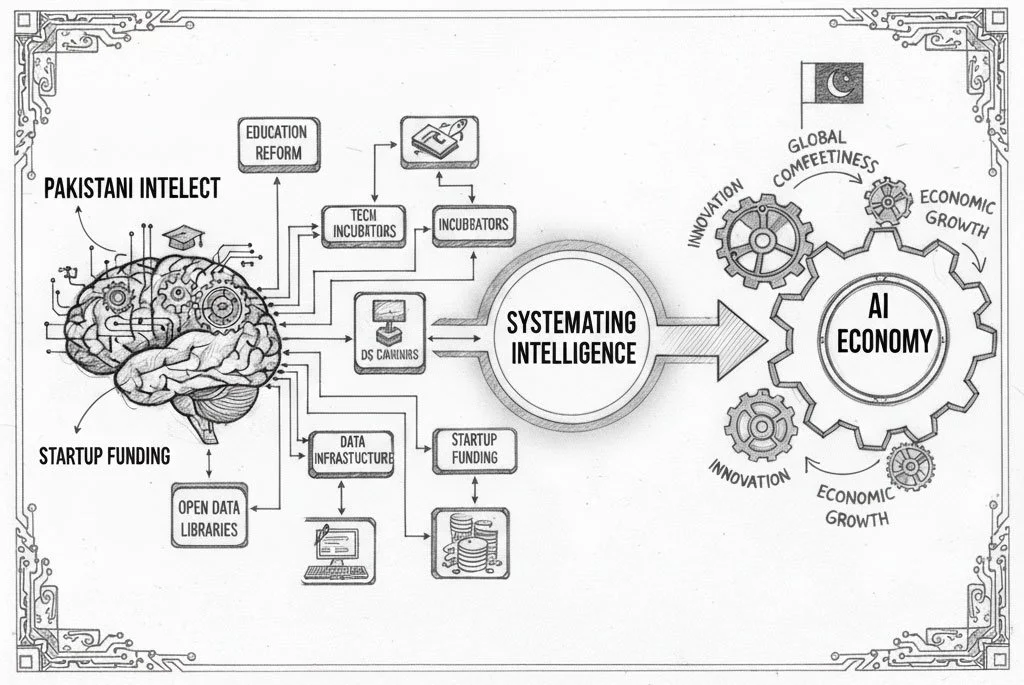Pakistan and the Next Global Business Cycle: The Age of Intelligence
For over two centuries, the rhythm of the global economy has been defined by cycles of credit, industry, and technology. Each age had its engine: steam powered the 19th century, electricity fueled the 20th, and the internet reshaped the early 21st. Now, a new cycle is unfolding. The one built not on energy or communication, but on intelligence itself.
AI represents a new kind of business cycle. It’s structural as it is fundamentally changing production functions and labor markets. Yet it behaves cyclically in capital markets (waves of investment, hype, consolidation, and utility). In other words, AI is the next “industrial revolution”, but its impact unfolds like a business cycle with surges of innovation, speculative investment, consolidation, and mainstream adoption.
For decades, Pakistan’s economic rhythm has been defined by familiar cycles for agriculture, remittances, energy, and trade. Each upturn promised stability; each downturn exposed structural weakness. As the new era of AI emerges, Pakistan's future competitiveness will largely be dependent on the nation's ability to effectively leverage its collective intelligence.
The next global cycle won’t just be built on commodities or exports. It will be built on intelligence and how nations harness it. The countries that master AI will not just grow faster, they will set the rules.
Mapping the Next Global Business Cycle
The Rise of AI as a Global Driver:
Here’s how AI is anticipated to play out as the new global economic cycle:
Investment Phase: Massive private and public capital flowing into AI infrastructure (data centers, chips, models).
Productivity Phase: Industries integrating AI for efficiency (banking, manufacturing, healthcare, logistics).
Displacement Phase: Labor disruption, re-skilling challenges, and new job creation in AI-adjacent sectors.
Equilibrium Phase: AI becomes a general-purpose layer, enabling new business models and cycles to build atop it.
Essentially, AI is now the engine of cyclical transformation across all industries — the way electricity or the internet once were.
How Pakistan Can Join the AI Economy
Systematizing Intelligence:
Around the world, AI is no longer a buzzword. It is a new production layer that is transforming manufacturing, finance, education, and governance. This shift represents both a risk and an opportunity for Pakistan.
Unlike past industrial revolutions that required vast factories or oil reserves, the AI revolution rewards data, creativity, and human capital. While all these things are in abundance in Pakistan, it is yet to be systematized.
Pakistan’s participation in this cycle depends on whether we can turn our demographic advantage, a young, connected population into an AI-empowered workforce.
AI could directly impact several of Pakistan’s structural weaknesses:
Agriculture: Predictive analytics can improve yields, optimize irrigation, and reduce losses — potentially adding billions to GDP.
Health: AI diagnostics and telemedicine can offset the shortage of doctors in rural areas.
Finance: AI-driven credit scoring can unlock access for millions of unbanked citizens.
Education: Personalized learning platforms can bridge the learning gap for underserved youth.
Governance: Smart data use can improve service delivery and accountability.
Each of these is not just an economic opportunity but a nation-building project.
Rewiring Pakistan’s Competitiveness
The Role of Business Leaders in the AI Age:
In Pakistan, business leaders now stand at the frontier of a new industrial revolution. As the world moves from the investment to the productivity phase of the AI business cycle, our private sector’s role is no longer passive. It must become the engine that converts technology into national competitiveness.
The state can create policy, but it is business that operationalizes transformation. Pakistani business leaders must take responsibility for three immediate fronts:
AI Adoption Inside the Firm
Leaders must treat AI not as a cost-saving gadget, but as a strategic capability. This means using data and automation to drive decision-making, optimize supply chains, and personalize customer experience. Every industry from textiles to banking can gain productivity multipliers if leadership actively drives internal AI literacy.Workforce Reskilling
The productivity phase will reward firms that upskill their people, not replace them. Forward-looking leaders should sponsor internal AI learning programs, partner with academic & experts to create “applied AI labs” where employees experiment with real business problems. The real national dividend will come when Pakistani workers become AI-augmented professionals, not displaced ones.Collective Competitiveness
No single company can build an AI ecosystem. Business associations, chambers, and corporate coalitions must push for shared AI infrastructure; from open datasets to industry training standards. The private sector can co-invest with the government in digital public goods that enable local startups and SMEs to participate in the AI cycle.
Ultimately, business leaders carry a responsibility beyond profits. In the coming era, this responsibility is to turn technology into productivity, and productivity into prosperity.
If Pakistan’s corporate sector rises to this challenge, it won’t just automate processes; it will help automate progress. This shift will not happen automatically. It requires vision, investment, and storytelling to build confidence in the idea that Pakistan’s digital and cultural capital can compete globally.
___
This article has been published in connection with the launch of AI Essentials for Business Leaders, a workshop by VCast Academy in partnership with Mercurial Minds. The program aims to equip Pakistan’s business community with the knowledge and tools needed to lead confidently in the emerging age of Artificial Intelligence.






